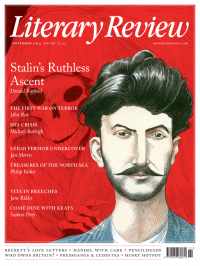James Purdon
Tape Measures
Amnesia
By Peter Carey
Faber & Faber 377pp £18.99
The exemplary creative writers of our time – we may as well admit it – are not the novelists but the computer coders. As algorithms and subroutines have become the infrastructure of our daily digital lives, the writers of code have fulfilled the novelist’s dream, building alternate worlds out of language. Does it matter that the languages in question happen to be Java and Python rather than English or Spanish? Like the Knight of the Rueful Countenance, we are all now part-time inhabitants of spaces fabricated by writing, virtual worlds that shape our sense of reality as surely as Amadis de Gaula and Feliciano de Silva shaped Don Quixote’s.
Peter Carey’s narrators have always been first-rate fabricators and inventors of inviting fictions. In Amnesia the role falls to Felix Moore, a boozy Sydney journalist whose obsessive left-wing crusades have earned him the nickname Felix ‘Moore-or-less-correct’. Having just lost an expensive defamation suit, Felix is in no position to refuse

Sign Up to our newsletter
Receive free articles, highlights from the archive, news, details of prizes, and much more.@Lit_Review
Follow Literary Review on Twitter
Twitter Feed
Under its longest-serving editor, Graydon Carter, Vanity Fair was that rare thing – a New York society magazine that published serious journalism.
@PeterPeteryork looks at what Carter got right.
Peter York - Deluxe Editions
Peter York: Deluxe Editions - When the Going Was Good: An Editor’s Adventures During the Last Golden Age of Magazines by Graydon Carter
literaryreview.co.uk
Henry James returned to America in 1904 with three objectives: to see his brother William, to deliver a series of lectures on Balzac, and to gather material for a pair of books about modern America.
Peter Rose follows James out west.
Peter Rose - The Restless Analyst
Peter Rose: The Restless Analyst - Henry James Comes Home: Rediscovering America in the Gilded Age by Peter Brooks...
literaryreview.co.uk
Vladimir Putin served his apprenticeship in the KGB toward the end of the Cold War, a period during which Western societies were infiltrated by so-called 'illegals'.
Piers Brendon examines how the culture of Soviet spycraft shaped his thinking.
Piers Brendon - Tinker, Tailor, Sleeper, Troll
Piers Brendon: Tinker, Tailor, Sleeper, Troll - The Illegals: Russia’s Most Audacious Spies and the Plot to Infiltrate the West by Shaun Walker
literaryreview.co.uk